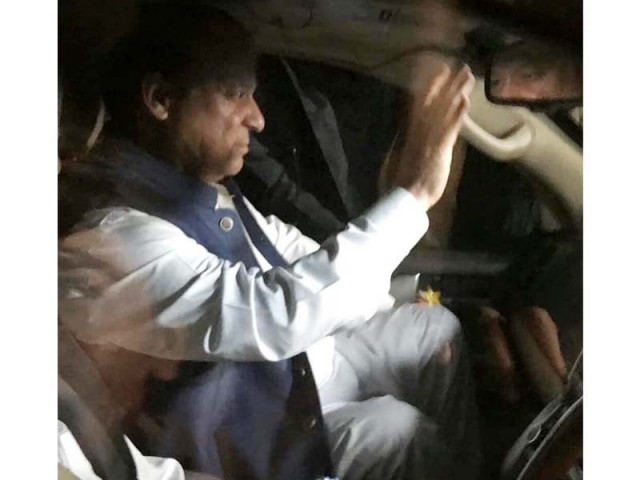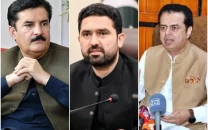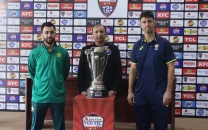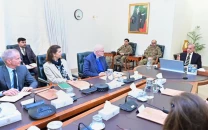Cabinet panel says indemnity bond was NAB's idea
NAB representatives also apprised subcommittee of granting only one-time permission to Nawaz

A file photo of former PM Nawaz Sharif. PHOTO: EXPRESS
The detailed report of the federal cabinet's subcommittee, which was tasked to decide the matter, states that it was NAB's idea not to allow the former premier to leave the country without evolving a proper mechanism to ensure his return.
A copy of the report is available with The Express Tribune.
I hold no grudge against Nawaz: PM Imran
"The federal government [may] evolve a mechanism to ensure that if Nawaz is permitted to travel abroad he will make himself available, if and when required by the concerned forums," stated a NAB letter written to the government on November 11.
In view of the letter's content, the subcommittee asked NAB representatives Umer Randhawa and Qamar Shehzad Phaphra about the "specific mechanism" to ensure Nawaz's return to Pakistan after a successful medical treatment.
NAB apprised the subcommittee that there was no mechanism except for securing an indemnity bond and granting only one-time permission.
Later, the subcommittee directed NAB to submit a clarificatory reply.
Upon this, NAB authorities on November 13 submitted, "As per the media source/reports the proposed mechanism stipulated by the federal government for dealing with the ECL [Exit Control List] issue of Nawaz is most appropriate and workable.
"In the media on November 12, 2019, it was widely broadcasted that the federal government is agreeable to a one-time permission to Nawaz for four weeks, subject to him or Shehbaz submitting an indemnity bond of the amounts determined by the accountability courts. This being so, the NAB authorities appear to be agreeable."
However, the committee was mindful that in terms of Rule 3(c) of 2010 Rules a person who had been convicted by a court of law for any offence should remain on the ECL for so long as the said order of placing him on the ECL was in force and till his conviction attained finality. "The convictions of Nawaz have not attained finality," stated the report.
"Therefore, the federal government is not in a position to lift the name of Nawaz from the ECL but having said so, looking at the gravity of his medical condition and the past practice of the federal government, he could be granted a one-time permission, which does not amount to lifting his name from the ECL," stated the report.
LHC admits PML-N plea seeking unconditional travel permission for Nawaz
PML-N President Shehbaz Sharif on November 7 requested the removal of the name of his elder brother Nawaz, from the ECL on the ground that he was exceedingly ill as, inter alia, his blood platelet count had fallen to critical levels.
Upon this, the committee sought comments from NAB, secretary specialised health care and medical education department Punjab and the Services Institute of Medical Sciences (SIMS)/Services Hospital, Lahore principal.
"From the medical reports on record and also from the discussion with Prof Dr Mehmood Ayyaz and Dr Adnan Khan there is hardly any dispute that the medical condition of Nawaz is absolutely critical. It may be stated that the blood platelet count of a healthy human being ranges from 150,000 to 400,000, whereas the blood platelet count of Nawaz on October 22, 2019 had dropped to about 2,000. After blood transfusion on October 22 his blood platelet count only increased to 13,000, while on October 24, 2019 the blood platelet count again dropped to 6,000. We have been informed that presently the blood platelet count of Nawaz is about 26,000, which is far below the minimum normal threshold of 150,000," stated the subcommittee report.
Doctors confirmed that Nawaz also suffered from carotid blood vessel disorder and had heart attacks of significant levels. In the past, he had also suffered a severe damage to his heart muscle known as acute myocardial infarction.
The report stated that the official board's November 11 final report said that Nawaz required genetic testing for addition of second anti-platelet agent to prevent the risk of thrombosis. This genetic testing is called "genotype guided strategy for oral P2Y12 inhibitor," which is not available in Pakistan, it added.
The subcommittee report discussed the status of criminal cases against Nawaz. The committee also referred Sindh High Court's order in Rauf B Kadri case wherein one-time permission to a convicted person was granted to perform Umrah.
"So, it is incorrect to suggest that a one-time permission to travel abroad cannot be given to a convicted person," said the report.
The subcommittee reviewed the medical record of Nawaz and was of the view that he might be permitted to pursue medical treatment abroad, subject to his own cost and risk.
"In the facts and circumstances of the case if the federal cabinet deems fit it may grant a one-time permission to Nawaz for four weeks to travel abroad for his medical treatment/tests, subject to either him or the applicant submitting an indemnity bond for an amount equal to the determined liability by the trial courts mentioned above, to the satisfaction of the additional secretary, Ministry of Interior," stated a note of the subcommittee.



















COMMENTS
Comments are moderated and generally will be posted if they are on-topic and not abusive.
For more information, please see our Comments FAQ